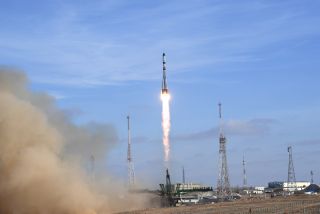Another robotic cargo craft is on its way to the International Space Station (ISS).
A Russian Progress freighter launched atop a Soyuz rocket from Baikonur Cosmodrome in Kazakhstan this morning (Dec. 6) at 4:34 EST (0934 GMT; 1434 local time at Baikonur), carrying 2.7 tons of food, propellant and other supplies toward the orbiting lab.
The liftoff came less than 24 hours after SpaceX's Dragon capsule began its own journey to the ISS as part of the CRS-19 resupply mission. Dragon is scheduled to arrive at the space station Sunday morning (Dec. 8), and the Progress (called Progress 74) will follow suit on Monday (Dec. 9).
Related: International Space Station: Facts, History & Tracking

"It’s always fun," Kenny Todd, manager of International Space Station Operations Integration at NASA, said about cargo missions during a prelaunch press conference on Tuesday (Dec. 3).
"These kind of dynamic events are something that everybody looks forward to, because it really is an opportunity to get some new cargo, some new tools on board and get some new science," he added. "So, we're really excited about this particular timeframe."
Dragon will return to Earth on or around Jan. 6, Todd said. The Progress, meanwhile, will stay attached to the ISS for about seven months. (Dragon will survive its return to Earth, by the way, whereas the Progress will burn up in our planet's atmosphere.)
There's a good chance some holiday goodies are tucked into both freighters; NASA, Russia and their ISS partners do like to treat crewmembers on the orbiting lab when they have a chance. Indeed, Todd was asked if Dragon is carrying anything especially seasonal on this trip, and his non-denial spoke volumes.
"As far as presents and so forth, I’m not sure I want to divulge anything," he said. "But I think I would tell you that Santa’s sleigh is — I think it’s certified for the vacuum of space. So, we’ll see what happens."
Dragon and Progress are two of four robotic spaceships that currently fly resupply missions to the ISS. The other two are Japan's H-II Transfer Vehicle, also known as Kounotori (Japanese for "white stork"), and Cygnus, which is operated by Virginia-based company Northrop Grumman. (Northrop Grumman, like SpaceX, holds a NASA resupply contract.)
Mike Wall's book about the search for alien life, "Out There" (Grand Central Publishing, 2018; illustrated by Karl Tate), is out now. Follow him on Twitter @michaeldwall. Follow us on Twitter @Spacedotcom or Facebook.

https://news.google.com/__i/rss/rd/articles/CBMiU2h0dHBzOi8vd3d3LnNwYWNlLmNvbS9ydXNzaWFuLXByb2dyZXNzLWNhcmdvLXNwYWNlY3JhZnQtbGF1bmNoZXMtc3BhY2Utc3RhdGlvbi5odG1s0gFXaHR0cHM6Ly93d3cuc3BhY2UuY29tL2FtcC9ydXNzaWFuLXByb2dyZXNzLWNhcmdvLXNwYWNlY3JhZnQtbGF1bmNoZXMtc3BhY2Utc3RhdGlvbi5odG1s?oc=5
2019-12-06 09:51:00Z
52780463228240
Tidak ada komentar:
Posting Komentar